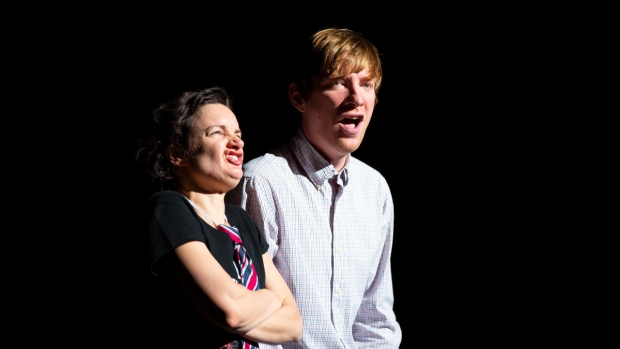
© Jess Shurte
In his programme note for Medicine, his new play here receiving its world premiere as part of the Edinburgh International Festival, Enda Walsh jokes that all of his works follow the same formula: characters are trapped in a room and search for an understanding of themselves which may or may not come. Sounds like a pretty good description of lockdown to me.
It's the moment of epiphany that matters, of course, but in Medicine that revelation brings more horror than freedom. This dark, troubling analysis of how the state treats the mentally ill was inspired by Walsh's reading of a book that examined the history of that subject in Ireland. He has produced a play that is taut and energetic, frequently bleak, but shot through with touches of absurdist humour.
It centres on the experience of John Kane, a patient at a residential psychiatric institution, brilliantly played by Domhnall Gleeson as a put-upon Everyman. In a room of the hospital that, incongruously, has been used for a staff party, John retells his story as what he calls a "Testimony", an attempt to engage with his past to see if he can qualify for some sort of release, though perhaps its real purpose is rather darker. He is helped by two performers, both called Mary, who act out the scenes as he tells them, while an unspeaking jazz drummer adds atmosphere through his music.
The play's power comes from the way that John's simple act of telling his life story taps into our hard-wired need for narrative. While John bares his soul in the hope of showing that he has come to terms with his treatment, the Marys, played by Clare Barrett and Aoife Duffin, bicker and argue, while absurd touches like a lobster outfit or a wind tunnel howling through the costume cupboard add some light to the texture. They're needed, because John's story quickly becomes one of desperate pity. He is a victim, helpless at the hands of others in the outside world, and equally unable to stand up for himself in the pitiless world of the hospital.
Gleeson's performance is a powerhouse. He runs the whole range of emotions from impotent victimhood to volcanic rage and it's impossible to take your eyes off him throughout. He carries the play as much by his delivery of the dialogue as by his uniquely expressive face, and he's a beautiful contrast to Clare Barrett's self-obsessed Mary, whose overblown account of her recurring erotic dream throws the simple honesty of John's story into even sharper relief.
Walsh's anger at the injustice of the situation burns with searing honesty throughout, and the intensity is heightened by the play's running time of 90 minutes without an interval. The final moments hint gently at the possibility of redemption, but by then John has seen into his own future, and the silent darkness of the final fade speaks of John's mental state as powerfully as any words could. It's chilling, powerful, and unforgettable.
The piece is co-produced with Landmark Productions and Galway International Arts Festival.












